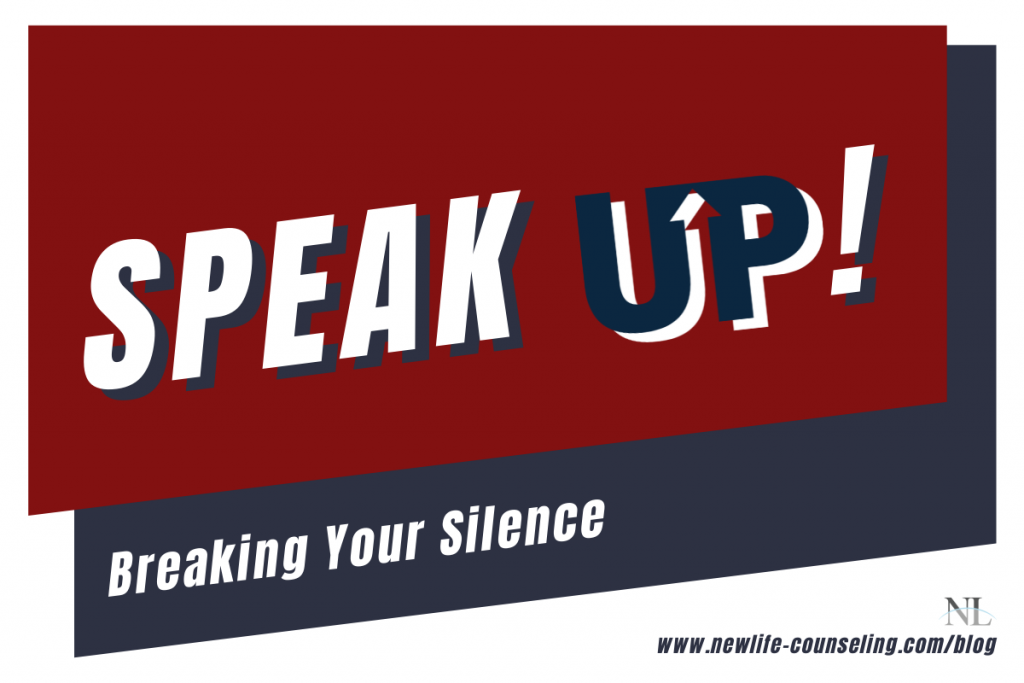Speak Up: Breaking Your Silence
We all want to be known, heard, and understood in our relationships. But the only way to do that is by speaking up and making yourself heard. Depending on your past experiences, including how you were raised and what your relationships (romantic and otherwise) have looked like, speaking up might not come naturally.

Your immediate inclination might be to keep quiet. We do this for many reasons:
- To feel safe and protected
- To avoid conflict or adversity
- To avoid judgement
- Fear of rejection or being wrong
- Someone told us our opinions and thoughts don’t matter
Each of these feelings are valid, but acting on them won’t help you develop healthy, long lasting relationships. And it certainly won’t allow you to authentically connect with others. Luckily, learning to speak up is like developing any other habit: With the right resources and enough practice, you can get pretty good at it.
The first step, when you want to express something, is deciding if it’s best to speak up or stay quiet.
Do this by evaluating three things about the situation: time, audience, and tone of voice.
Time
Is now the best time to have this conversation? Will there be enough time to properly discuss things without feeling rushed? Do you have the other person’s full attention? Are they in a good mood or already stressed and distracted?
Audience
Is the other person someone who will listen and genuinely care about what you have to say? Hopefully, if this person is close to you, the answer is yes. Unfortunately, difficult people aren’t always avoidable. When dealing with someone who won’t value your opinion, it’s best to either skip the conversation or realize no matter how well you handle it, the outcome probably won’t be what you’re looking for—and that’s OK.
Tone of voice
It’s not always what you say but how you say it that counts. When leading into an important conversation, make sure you’re able to speak in a way most conducive to being heard. For instance, if you’re highly emotional, it might not be the best time to discuss something that’s bothering you. Take a few moments to decompress and revisit the conversation when you’re in a better headspace.
Thoughts and feelings that make it through all three criteria move on to the next step: speaking up.
This part’s tricky, but so important. Next time you have something to say, practice these steps.
Validate and recognize your feelings
Before saying anything, validate what you’re feeling and why. Doing this not only reassures you what you’re about to say matters, but gives you the opportunity to think through how you’re going to phrase things and why you see it as necessary.
Set the tone
It’s normal to get nervous and worked up before saying something important. When this happens, take a few moments to set yourself up for success: practice deep breathing, physically shake out your nerves, write down what you’re going to say, and start slow. Still nervous? It’s okay to let the other person know that—they’ll respect and appreciate your honesty.
Shift your mindset
Recognize that just because you need to talk about something, doesn’t mean the other person is a bad person or in the wrong. It simply means there’s something you need to get off your chest. If you go into a tough conversation with a positive, intentional mindset, it will be vastly more effective. It’s also best to leave assumptions at the door. It’s impossible to know what someone else is thinking, so go into the conversation with open expectations.
Be honest and clear
You’ve made it this far, the last thing you want is to take the leap and not say what needs said. Avoid beating around the bush and sugar-coating—these won’t get you anywhere. State exactly how you’re feeling, why, and what you’d like to see done. Be honest, respectful, and clear.
Stick to one issue
Instead of trying to address everything that’s on your mind, stick to one thing at a time. This ensures nothing gets glossed over or ignored and the other person doesn’t feel overwhelmed or attacked.
Listen
The other essential piece of a healthy relationship? Listening.
After you’ve spoken your peace, give the other person the opportunity to respond. While they’re talking, truly listen with an open mind and heart. Don’t interrupt or plan your rebuttal. Show them the same respect you expected when it was your turn.
Wash, rinse, repeat every time you feel yourself needing to speak up. The more you do it, the better you’ll get and the easier it’ll become. Remember: Speaking up and feeling heard in your relationships is the only way to build healthy connections that last. You owe it to yourself and to others to find your voice and use it.
This blog post is written by Dr. Don Gilbert and is part of the subject matter for his upcoming book called, “Five Essential Habits of healthy Relationship.” Stay tuned and be sure to subscribe for updates on its release later this year!

Dr. Don Gilbert, MS, PHD, LMHC, BCPC
Dr. Gilbert is the owner of New Life Counseling. He trained under Dr. Gary Rosberg, is John Maxwell Certified, is an ordained minister, a published author, and has over 20 years of face to face counseling experience. Dr. Gilbert is no longer taking new counseling clients, but he is available for trainings, coaching, and speaking. Please contact us for more information.

